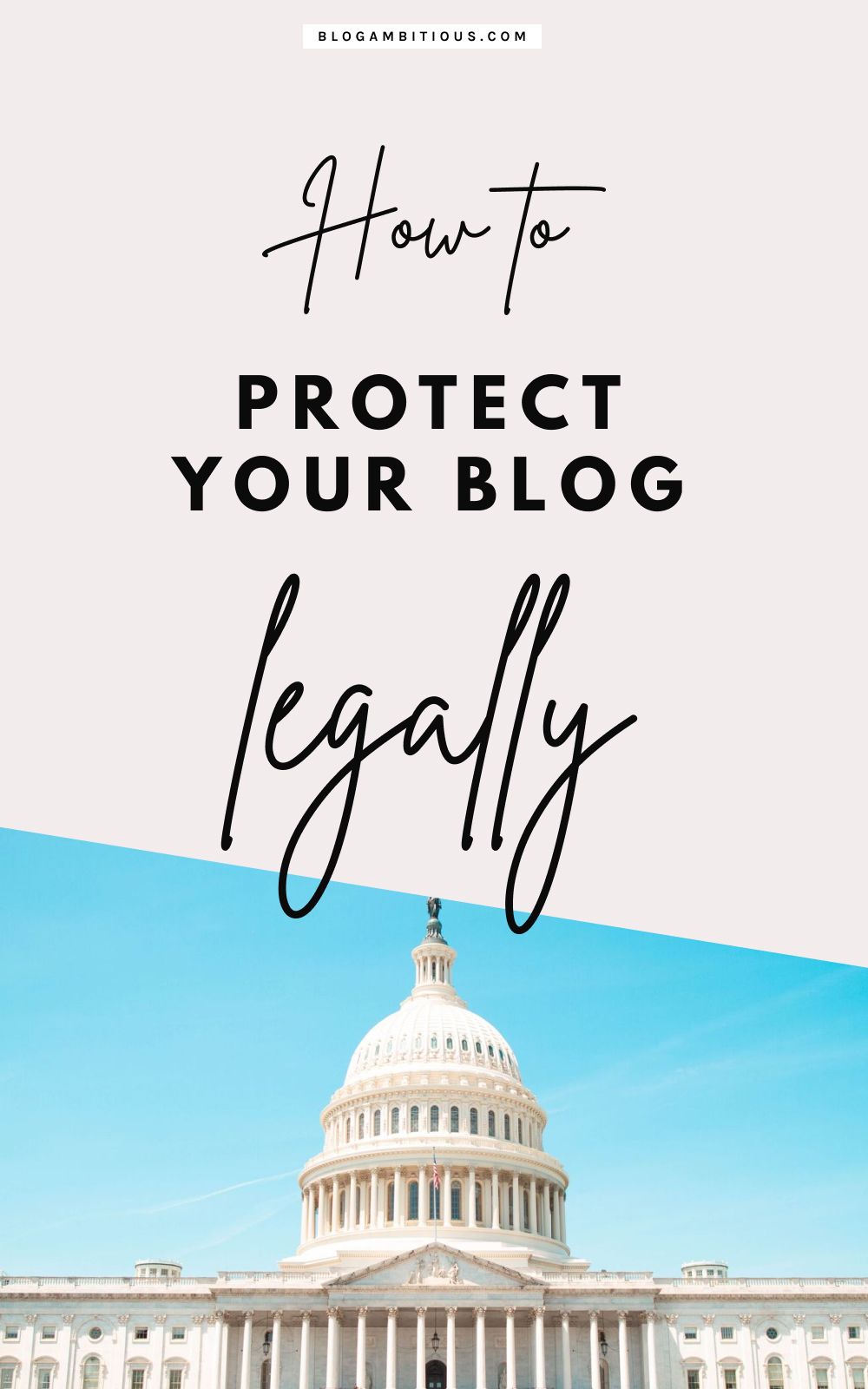Disclosure: This post is not legal advice, but rather general information that you can use as a starting point to seek further advice related to your blog.
Ok, now that that’s out of the way, let’s talk about a few legal aspects you may have forgotten about in the midst of publishing your awesome blog!
When you first launch a blog, creating content is often your primary priority. Getting your blog post structure right, upping your photography skills, and engaging with your audience takes up so much time that it’s easy to let other things slip through the cracks.
While you probably can get away with ignoring the legal aspects of blogging if you intend to keep it as an occasional hobby, you must protect yourself and your blog if you want to turn it into a business.
Today I’d like to share a few key ways you must legally protect your blog and business if you want to avoid heavy fines and potential jail time (!) if you really mess up.
Legal Blog Protection
Here are some tips for blogging legally. While there aren’t dedicated blogging rules and regulations, there are several general legal concepts that apply to blogging and other digital consumer-oriented businesses.
1. Create a Privacy Policy
The first thing to do is create a Privacy Policy if you don’t have one already!
A privacy policy is a key legal page for a blog. Essentially, a privacy policy is a document that explains what data your website retains from each visitor.
WordPress encourages you to create this page upon set-up with a fresh install, but if your blog is several years old, you might not have this page.
Go add one now!
You can find many sample privacy policies online if you don’t know what to put in yours. Google “free sample privacy policy” and several appear.
Depending on the plug-ins your website uses, there may be additional information you need to include such as Google Analytics tracking data, third-party affiliate marketing cookies, and advertising data if you have an ad management company. Each of these companies can advise you on what needs to be included in your privacy policy when using their services so feel free to reach out to them if you are unsure.
2. Disclose Your Partnerships & Gifts
I mentioned this in my sponsored posts article, but as a refresher, you need to disclose any financial relationships you have with retailers in the article itself. If you write about products or paid experiences, this applies to you!
Gifts and sponsored post items need to be clearly called out in the body of your blog post. Even if you paid for the item yourself but you stand to earn money through using an affiliate link, that must be disclosed to readers.
You can read more about FTC affiliate disclosure advice here. Your disclosure needs to be “clear and conspicuous” so that a reasonable reader will understand that your review might be financially compensated.
Most major magazines have a disclosure at the top of their articles so you can find an example of this by reading one of your favorite publications.
3. Form an LLC
My next legal tip is to form an LLC for your blogging business.
An LLC protects your personal assets from litigation in the event that someone decides to sue your blog. Unless you live in an expensive state like California, state by state LLC formation fees are quite low and provide a lot of legal benefits.
Plus, you can deduct your business’s expenses and apply for a business credit card to help finance your business.
If you’re making more than $50,000 a year, you should consider forming an S-corporation with the help of a licensed CPA.
4. Avoid Breaking Copyright Laws
Avoid breaking any image copyright laws by only using images that you have taken yourself on your blog. You can also use copyright-free image finders like Unsplash to find free images to use on your blog. Tread carefully with these sites and ensure that you have the right to use those images as well.
The best way to avoid getting sued is to create your own blog photography or use CC0 (Creative Commons Zero) free stock images.
5. Don’t Plagiarize
Plagiarism is fairly common in the blogging world. Only publish your own thoughts. Even taking part of an article from another blogger is sometimes forbidden, depending on the author. Instead, reach out to the blogger and ask if you can quote them on your blog, with credit. Most will be ok with this in exchange for a link back to their website. Definitely don’t take an entire article and publish it on your site.
Side note: I actually had this happen to me with three of the articles on this site – someone stole the exact articles, but they changed the very first sentence. She had done it to several other bloggers as well, and one of them reached out to let me know. We contacted her hosting provider, filed a DMCA complaint, and we successfully got her blog taken down. Don’t mess around with this!
Along those lines, do a Google search for the blog name you wish to use before buying the domain name and creating your social media profiles. Avoid any potential confusion and legal trouble if the blogger has trademarked their blog name. These are the major blogging copyright guidelines to know about.
I hope you have a better understanding of how to legally protect your blog and soon we’ll go into more depth on the different ways to protect an established blog like trademarking.
Let me know your thoughts in the comments below.


Informative guide on blogging legally! Essential tips for ensuring compliance and protecting content in the digital landscape.